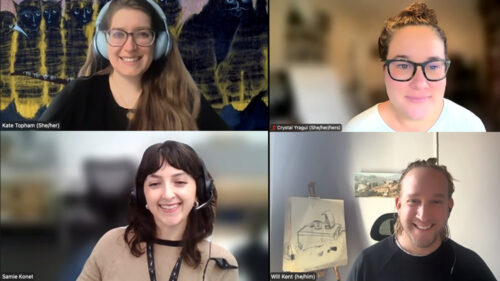Why is linked data important? How do Wikidata and library collections work together? What does a Wikidata project look like? To answer these questions and more (and to celebrate Wikidata’s birthday this month!), Wiki Education hosted the Speaker Series webinar Supercharging Cultural Institution Collections with Wikidata on October 23.
Panelists Kate Topham, Digital Scholarship Specialist at the University of Michigan Library, Samie Konet, Dance Audio and Moving Image Cataloger, Special Collections Processing at the New York Public Library (NYPL), and Crystal Yragui, LD4, Science Cataloger, University of Washington Libraries kindly joined me for the one-hour discussion, which was attended by Wikidata enthusiasts from across the world.

Wikidata is a vast resource, able to host a diverse set of projects, and the projects the panelists shared with us underscored this broad spectrum.
Kate framed Wikidata as a means of data pluralism* – a collaborative project and effort to create collective knowledge. A part of the Comics as Data project, she detailed how Wikidata enabled the group to normalize, enrich, and (at times) correct catalog data by engaging communities of comics enthusiasts and experts. Layered into this collective work is a shared sense of ownership and stewardship, a characteristic that is unique to Wikidata. This has allowed the project to grow and expand into several state-level initiatives to improve comics data both on Wikidata and with local collections.
*This concept comes from the book, Data Feminism, which you should definitely read: https://data-feminism.mitpress.mit.edu/
Focusing on a similarly specific dataset, Samie outlined how her Wikidata projects complement her library work. At NYPL, Samie works with dance collection data and is creating complimentary entries for the choreographic works. Her work overlaps in the NACO Choreographic Works Project group as well as the LD4 Arts Affinity Group, which has recently extended its scope to address performing arts and expanded media projects. Wikidata, it turns out, is an ideal location for creating description data for a publicly accessible linked data ecosystem and expanding the reach of cataloging and authority control work beyond the library catalog.
Expanding to a broad scope, Crystal presented about coordinated library efforts to improve describing holdings. At this level, organizations work together to develop policies, guidelines, and documentation about description. The Project for Cooperative Cataloging’s (PCC) Entity Management Cooperative (EMCO) programs are two groups that work on this. They have a bridge to Wikidata in a Community of Practice. Crystal shared with us how the EMCO program is in the Early Adopter Phase (EAP), explored specific EAP goals, highlighted application profiles for persons and corporate bodies, and explained how attendees can get involved in the future. This high level programing can impact metadata, cataloging, and description efforts across many institutions. Coordinating among these groups to create pipelines to and from Wikidata takes a lot of effort, and these groups certainly exemplify how to do it well!
As our discussion emphasized, the implications of this work can be far reaching. How do you decentralize description? How do you describe entities more accurately and fairly? How do you share this data in an effective way?
Wikidata is a big part of the answer to these questions. During our conversation, panelists explained how they first discovered Wikidata and what surprised them about the platform and community, sharing perspectives that resonated with fellow panelists and audience members. We also talked about future Wikidata projects and the advice they would give Wikidata newcomers. All answers were indispensable and had one universal thread: the Wikidata community is what makes it special. Everyone together embodies a resource that makes Wikidata a remarkable, transformative experiment.
There is still a lot of work to do. Wikidata has profound potential to represent our world more accurately, thoroughly, and collectively, for both humans and machines. If you want to learn more about Wikidata or any of these projects, or take a Wikidata course, do not hesitate to reach out to me!
Missed the event and interested in catching up? You can explore all previous Speaker Series webinar recordings (including this Wikidata discussion) on our website. We hope to see you at a future Wiki Education Speaker Series!
Interested in incorporating a Wikipedia assignment into your course? Visit teach.wikiedu.org to learn more about the free resources, digital tools, and staff support that Wiki Education offers to postsecondary instructors in the United States and Canada.
Interested in learning how to add your expertise to Wikipedia? Explore Wiki Education’s upcoming courses for subject-area experts.
